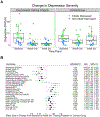Effects of an immersive psychosocial training program on depression and well-being: A randomized clinical trial
- PMID: 35429739
- PMCID: PMC9107501
- DOI: 10.1016/j.jpsychires.2022.02.034
Effects of an immersive psychosocial training program on depression and well-being: A randomized clinical trial
Erratum in
-
Corrigendum to "Effects of an immersive psychosocial training program on depression and well-being: A randomized clinical trial" [J. Psychiatr. Res. 150 (2022) 292-299].J Psychiatr Res. 2024 Nov;179:163-166. doi: 10.1016/j.jpsychires.2024.09.015. Epub 2024 Sep 17. J Psychiatr Res. 2024. PMID: 39293121 No abstract available.
-
Corrigendum to "Effects of an immersive psychosocial training program on depression and well-being: A randomized clinical trial" [J. Psychiatr. Res. (2022) 150: 292-299].J Psychiatr Res. 2025 Nov;191:814-816. doi: 10.1016/j.jpsychires.2025.06.035. Epub 2025 Jul 30. J Psychiatr Res. 2025. PMID: 40738822 No abstract available.
Abstract
Psychiatry stands to benefit from brief non-pharmacological treatments that effectively reduce depressive symptoms. To address this need, we conducted a single-blind randomized clinical trial assessing how a 6-day immersive psychosocial training program, followed by 10-min daily psychosocial exercises for 30 days, improves depressive symptoms. Forty-five adults were block-randomized by depression score to two arms: (a) the immersive psychosocial training program and 10-min daily exercise group (36 days total; total n = 23; depressed at baseline n = 14); or (b) a gratitude journaling control group (36 days total; total n = 22; depressed at baseline n = 13). The self-report PHQ-9 was used to assess depression levels in both groups at three time points: baseline, study week one, and study week six. Depression severity improved over time, with a significantly greater reduction in the psychosocial training program group (-82.7%) vs. the control group (-23%), p = 0.02 for baseline vs. week six. The effect size for this reduction in depression symptoms was large for the intervention group (d = -1.3; 95% CI, -2.07, -0.45; p < 0.001) and small for the control group (d = -0.3; 95% CI, -0.68, 0.03; p = 0.22). Seventy-nine percent (11/14) of depressed participants in the intervention condition were in remission (PHQ-9 ≤ 4) by week one and 100% (14/14) were in remission at week six. Secondary measures of anxiety, stress, loneliness, and well-being also improved by 15-80% in the intervention group (vs. 0-34% in the control group), ps < 0.05. Overall, this brief, immersive psychosocial training program rapidly and substantially improved depression levels and several related secondary outcomes, suggesting that immersive interventions may be useful for reducing depressive symptoms and enhancing well-being.
Keywords: Depression; Health; Intervention; Resilience; Stress; Well-being.
Copyright © 2022 The Authors. Published by Elsevier Ltd.. All rights reserved.
Conflict of interest statement
Declaration of competing interest
We have no conflicts of interest.
Figures


References
-
- Butler J, Kern ML, 2016. The PERMA-Profiler: a brief multidimensional measure of flourishing. Intnl. J. Wellbeing 6, 1–48.
-
- Cosci F, Chouinard G, 2020. Acute and persistent withdrawal syndromes following discontinuation of psychotropic medications. Psychother. Psychosom 89, 283–306. - PubMed
-
- Dejesus RS, Vickers KS, Melin GJ, Williams MD, 2007. A system-based approach to depression management in primary care using the Patient Health Questionnaire-9. Mayo Clin. Proc 82, 1395–1402. - PubMed

